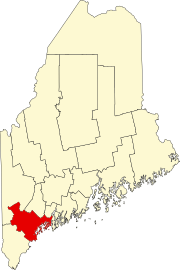2010 census
As of the census [8] of 2010, there were 9,874 people, 3,518 households, and 2,572 families living in the town. The population density was 167.3 inhabitants per square mile (64.6/km2). There were 4,425 housing units at an average density of 75.0 per square mile (29.0/km2). The racial makeup of the town was 97.3% White, 0.5% African American, 0.3% Native American, 0.5% Asian, 0.2% from other races, and 1.2% from two or more races. Hispanic or Latino of any race were 0.8% of the population.
There were 3,518 households, of which 33.7% had children under the age of 18 living with them, 58.7% were married couples living together, 9.7% had a female householder with no husband present, 4.6% had a male householder with no wife present, and 26.9% were non-families. 19.3% of all households were made up of individuals, and 5.9% had someone living alone who was 65 years of age or older. The average household size was 2.60 and the average family size was 2.95.
The median age in the town was 38.8 years. 21.7% of residents were under the age of 18; 13.6% were between the ages of 18 and 24; 24.1% were from 25 to 44; 30.4% were from 45 to 64; and 10.2% were 65 years of age or older. The gender makeup of the town was 49.2% male and 50.8% female.
2000 census
As of the census [9] of 2000, there were 9,285 people, 3,205 households, and 2,464 families living in the town. The population density was 157.2 inhabitants per square mile (60.7/km2). There were 3,987 housing units at an average density of 67.5 per square mile (26.1/km2). The racial makeup of the town was 98.08% White, 0.39% African American, 0.16% Native American, 0.24% Asian, 0.08% Pacific Islander, 0.23% from other races, and 0.83% from two or more races. Hispanic or Latino of any race were 0.46% of the population.
There were 3,205 households, out of which 37.0% had children under the age of 18 living with them, 64.0% were married couples living together, 8.9% had a female householder with no husband present, and 23.1% were non-families. 16.7% of all households were made up of individuals, and 6.0% had someone living alone who was 65 years of age or older. The average household size was 2.72 and the average family size was 3.03.
In the town, the population was spread out, with 25.3% under the age of 18, 13.1% from 18 to 24, 30.5% from 25 to 44, 23.0% from 45 to 64, and 8.2% who were 65 years of age or older. The median age was 34 years. For every 100 females, there were 94.4 males. For every 100 females age 18 and over, there were 90.4 males.
The median income for a household in the town was $50,278, and the median income for a family was $53,461. Males had a median income of $36,235 versus $26,204 for females. The per capita income for the town was $19,504. About 1.9% of families and 3.6% of the population were below the poverty line, including 3.8% of those under age 18 and none of those age 65 or over.







